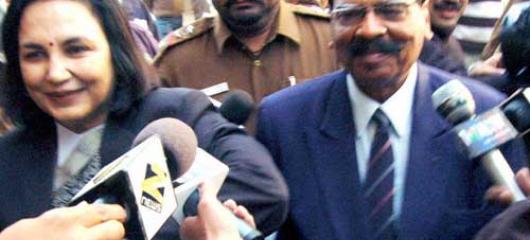Smirk. Yes, it was that disgustingly mocking smirk on Rathore’s face that made the nation turn around and say collectively, “Wait, you dirty old man, we’ll wipe that sickening smile off your shameless face!” And a public trial began, wherein he was promptly held ‘guilty more-than-charged’. The media zoomed into Rathore and put him under such dazzling light with such consistency that he could neither hide, nor could his more-that-considerable political clout extend enough protection. Finally, charges of ‘Abetment of suicide’ under Section 306 of the IPC were slapped against Rathore. The question now is whether or not the charge can stand legal scrutiny in a court of law.
Getting Rathore convicted for abetment is not going to be a cakewalk not because he is influential but because establishing a charge of abetment of suicide is itself quite tough on account of the requirement of the law to prove a definite ‘guilty intention’. If there is nothing to show that the accused intended to abet suicide of the deceased, the mere fact that it was something that the accused said or did that prompted the deceased commit suicide is not sufficient in itself to prove abetment beyond reasonable doubt.
 It must be proved that the accused knew that by saying or doing what he said or did, he was very likely to make the deceased inclined to inflict self-harm and he should have, at the very least, demonstrably done nothing to stop it, even if it could not be shown that he actually ‘intended’ the deceased to commit suicide and what he said or did was directed at furthering such intention.
It must be proved that the accused knew that by saying or doing what he said or did, he was very likely to make the deceased inclined to inflict self-harm and he should have, at the very least, demonstrably done nothing to stop it, even if it could not be shown that he actually ‘intended’ the deceased to commit suicide and what he said or did was directed at furthering such intention.
To make all the right connections in a court of law in such cases is much tougher than it might seem at first because the mental states of both the deceased as well as the accused have to be considered and ascertained through evidence, which is certainly not easy. Furthermore, it must also be shown that the accused knew the deceased well enough to predict his or her reaction under the conditions in question. The only way around this is to establish that the circumstances created by the accused were such that the majority of people would commit suicide, which is even harder to prove.
Interestingly, 3 Idiots, recent Bollywood blockbuster starring Aamir Khan, touches the theme of abetment of suicide in two different sequences. An engineering student by the name Joy Lobo commits suicide when the Principal of the college refuses extension for the submission of the project thereby frustrating Lobo’s attempt to graduate that year. At the cremation, Ranchordas Shyamaldas Jhanjar alias Rancho, played by Aamir Khan, comes up to the Principal and remarks that it was not suicide but ‘murder’ implying that Lobo was pushed to kill himself by the frustration resulting from unbearable academic pressure. In similar vein, the daughter of the Principal, also accuses her father of having ‘murdered’ his own son by forcing him to attempt entrance tests to the engineering college instead of allowing him to study literature, which he so ardently wanted to, and thus pushing him to commit suicide.
Of course, neither is murder because they are not homicides, but it is strongly suggested that these were instances of abetment of suicide, which, again, they are not for want of the legal prerequisite of intent on the part of the Principal.
 The Principal points out to Rancho that he could not be blamed if a student fails to take the pressure of studies, which all other students do. Naturally, the intention of the Principal is to make the students study harder and not to push any of them to commit suicide. And if a student does so, it is because of his own inability to adapt and respond. Nobody else can be blamed for it unless the intent to abet suicide is shown. It is much the same thing that the Supreme Court said in State of West Bengal v. Orilal Jaiswal, (1994) 1 SCC 73:
The Principal points out to Rancho that he could not be blamed if a student fails to take the pressure of studies, which all other students do. Naturally, the intention of the Principal is to make the students study harder and not to push any of them to commit suicide. And if a student does so, it is because of his own inability to adapt and respond. Nobody else can be blamed for it unless the intent to abet suicide is shown. It is much the same thing that the Supreme Court said in State of West Bengal v. Orilal Jaiswal, (1994) 1 SCC 73:
If it appears to the Court that a victim committing suicide was hypersensitive to ordinary petulance, discord and difference in domestic life quite common to the society to which the victim belonged and such petulance, discord and difference were not expected to induce a similarly circumstanced individual in a given society to commit suicide, the conscience of the Court should not be satisfied for basing a finding that the accused charged of abetting the offence of suicide should be found guilty.
Again, recently, in Gangula Mohan Reddy v. State of Andhra Pradesh, Criminal Appeal no. 1301 of 2002 (Decided on January 5, 2010), insisting on the presence of clear mens rea the Supreme Court ruled:
The intention of the Legislature and the ratio of the cases decided by this court is clear that in order to convict a person under section 306 IPC there has to be a clear mens rea to commit the offence. It also requires an active act or direct act which led the deceased to commit suicide seeing no option and this act must have been intended to push the deceased into such a position that he committed suicide.
In SPS Rathore case, it is quite clear that the deceased was harassed by all means and Rathore used all his influence to ensure that life was made a living hell for her and her family, which led her to commit suicide. The harassment and suicide are, therefore, connected. However, the legal question is whether or not Rathore intended the harassment to lead to suicide by the deceased.
A related question that is sure to arise is what did Rathore stand to gain from the death of the deceased? What could possibly be the motive to abet suicide? Perhaps, Rathore wanted to harass the family into silence. What additional purpose could the deceased’s death serve? Unless and until the investigators find convincing answers to these questions well supported by concrete evidence, Rathore’s conviction for abetment of suicide is very likely to remain a fond dream.
Originally published on my WordPress Blog on January 20, 2010.






